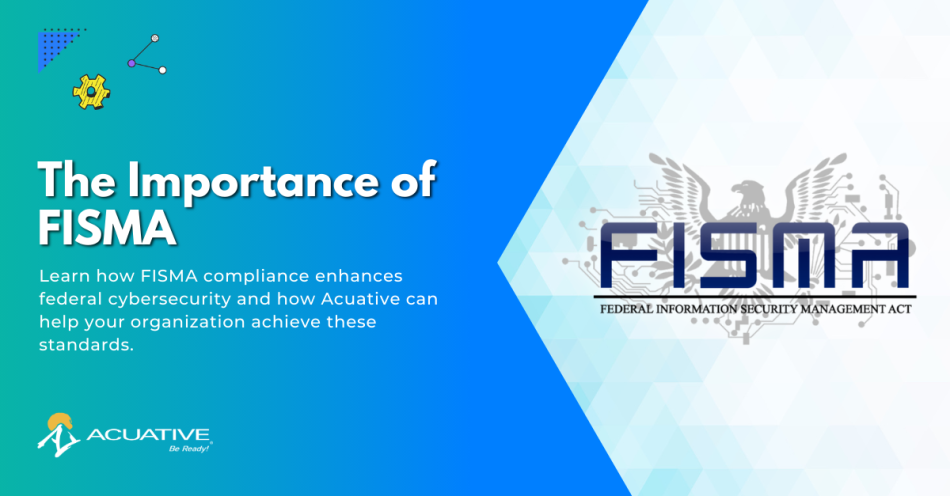Gregory Hill
For modern businesses, compliance isn’t just a checkbox—it’s a critical foundation for trust and operational resilience. The Federal Information Security Management Act (FISMA) sets essential standards for protecting government information and systems, and at Acuative, we take that responsibility seriously. In this blog, we’ll explore the importance of FISMA, what it means for organizations working with federal agencies, and how Acuative’s compliance and service offerings support secure, reliable network infrastructure.
What is FISMA?
The Federal Information Security Management Act (FISMA) is a cornerstone of U.S. federal cybersecurity policy. FISMA mandates federal agencies, contractors, and organizations handling federal data to implement a comprehensive framework to protect sensitive information from cyber threats. Within the framework and guidelines provided by the National Institute of Standards and Technology (NIST), FISMA establishes requirements for risk management, continuous monitoring, and incident response. The policy is legally required for government entities and typically mandated for SLED and private-sector partners, ensuring a uniform security standard across Federal systems. Compliance is validated through annual audits and the issuance of an Authority to Operate (ATO), making FISMA a rigorous and evolving standard in an era of increasing cyber risks.
Why FISMA Matters
The importance of FISMA lies in its role as a safeguard for national security, public trust, and operational continuity. With cyber threats growing in sophistication—ranging from data breaches to ransomware attacks—FISMA ensures that federal systems remain resilient and that sensitive data, such as citizen records or classified information, is protected. Beyond security, FISMA compliance fosters accountability, requiring agencies and their partners to document and mitigate risks proactively. For federal contractors, compliance is often a prerequisite for securing contracts, while noncompliance can result in penalties, loss of contracts, or reputational damage. In a digital-first world, FISMA’s emphasis on adaptability and continuous improvement makes it a critical tool for defending against both current and emerging threats.
Acuative’s FISMA Compliance
Acuative, a leading provider of advanced technology and managed services, has established itself as a trusted partner for U.S. federal agencies by developing FISMA compliant managed service solutions. This milestone underscores Acuative’s commitment to delivering secure, reliable, and compliant network solutions that safeguard sensitive government information, operations, and assets. Since 2020, Acuative’s compliance has been independently verified through annual audits by accredited third-party assessors, confirming its alignment with the stringent security standards demanded by federal agencies. Leveraging collaborations with industry leaders including Fortinet Federal, Cisco, and VMware (VeloCloud), Acuative integrates certified technologies—such as FortiManager, Cisco’s secure networking tools, and VMware VeloCloud SD-WAN—into a robust, InfoSec-hardened management service infrastructure. This infrastructure empowers federal agencies transitioning to the General Services Administration’s Enterprise Infrastructure Solutions (EIS) contract, driving secure and efficient digital transformation.
Services Enabled by FISMA Compliance
Based on this FISMA compliance, Acuative offers a suite of specialized services tailored to the needs of government agencies and contractors:
- Managed Network Services: Acuative delivers end-to-end managed network solutions, including SD-WAN and Next-Generation Firewall (NGFW) capabilities, ensuring secure connectivity and real-time threat protection aligned with FISMA’s continuous monitoring mandates.
- Cloud Security and Deployment: Acuative’s privately hosted managed service solution ensures FISMA compliance for federal clients, while also supporting hybrid models where sensitive data and applications can integrate with cloud-based components, offering encrypted backups and disaster recovery tailored to stringent security standards.
- Compliance Consulting and Auditing Support: Acuative provides expert guidance, including gap analyses and system security plan development, to help clients achieve and maintain FISMA compliance and secure their ATO.
- Cybersecurity Monitoring and Incident Response: With proactive threat detection and rapid response capabilities, Acuative meets FISMA’s continuous monitoring requirements, maintaining a strong security posture for clients.
- Tailored IT Solutions for Federal Contractors: Acuative aligns vendors’ IT systems with FISMA standards, ensuring eligibility for government contracts and protecting against compliance risks.
Acuative’s Proven Impact
Acuative’s proven track record—highlighted by its selection as an exclusive partner by a major U.S. carrier for FISMA-compliant SD-WAN services—demonstrates its ability to deliver high-performance, secure solutions across federal, state, and local government sectors. By combining technical expertise and a client-centric approach, Acuative empowers organizations to leverage FISMA compliance for mission success.
Ready to strengthen your network with a trusted, FISMA-compliant partner? Contact Acuative today to learn how we can support your agency’s goals with secure, scalable solutions.
About Greg Hill
 Greg Hill is an IT service management professional with over 25 years of experience helping enterprises and service providers align IT strategy with business outcomes. As a CISSP, certified ITIL Expert and accomplished ITSM practice leader, he writes about practical approaches to service management, organizational maturity, and driving value through process, technology, and data. His insights draw from real-world experience leading large-scale ITSM transformations, and he is passionate about helping organizations modernize operations, improve service delivery, and build frameworks that support continuous improvement.
Greg Hill is an IT service management professional with over 25 years of experience helping enterprises and service providers align IT strategy with business outcomes. As a CISSP, certified ITIL Expert and accomplished ITSM practice leader, he writes about practical approaches to service management, organizational maturity, and driving value through process, technology, and data. His insights draw from real-world experience leading large-scale ITSM transformations, and he is passionate about helping organizations modernize operations, improve service delivery, and build frameworks that support continuous improvement.

